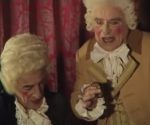Who fixed it for Jim?
Celebrity is used by the Establishment to distract those it rules; it is a tactic of control with no ‘moving parts’ that would make an unsuspecting citizen notice that it is a weapon being deployed against them. But consider, how many successful Hollywood movie stars, pop singers, or footballers are outspoken in the same way John Lennon was? The answer is not many. Most are remarkably unengaged with real issues because, one must suppose, they get what came to Lennon, or they get repaid with obscurity. When they do step out of line, they get slapped back into place.
So, it should come as no surprise that Operation Yewtree, supposedly the Metropolitan Police’s investigation into historical cases of paedophilia and sexual abuse, has taken Jimmy Savile’s celebrity as a cue to arrest some household names of the 1970s and the 1980s – most of which seem to have been taken completely by surprise at their new predicament. There are, of course, other aspects of Jimmy Savile’s life from whence he made connections to members of Britain’s ruling class; there are also connected rumours and allegations of paedophilia in high-up places. These links could be interrogated by police, but instead they have been completely overlooked.
There is, therefore, reasonable suspicion to be had that Yewtree is a cover-up, and indeed a psychological operation to establish in the minds of the observing public that paedophilia is a problem restricted to the arena of over-indulged television and radio personalities. Of course, this is set to be only a first impression, and the apparent scale of institutionalised child abuse will be made to look negligible as it becomes clear that most of those arrested are not paedophiles. Esther Rantzen, the one-time That’s Life presenter, and founder of children’s charity ChildLine, referred to this at the beginning of the year when she complained that arrests of celebrities for acts by one adult upon another (that are more often than not strenuously denied by the accused, or defended against by pleading innocent contact that has been miscontrued as general sexual pestering), threatened to trivialise child abuse: ‘When Yewtree swoops – and celebrity after celebrity has been targeted by them – we assume they’ve uncovered yet more sexual abuse of children.’
Last week, Scotland Yard released a report centring on the allegations against Savile; the image of Savile ‘grooming the nation’, as encouraged by the headline summarisation, unfortunately (and probably deliberately) represented paedophilia as a one-man scourge. The officer in command of the investigation, Peter Spindler, said that Savile had been allowed to get away with his abuse because he had used this celebrity to ‘hide in plain sight’.
The suggestion is that Savile wasn’t prosecuted because of the illusion of innocence created by his charity-working, child and hospital patient friendly public image. In other words, the weight of his persona would be too much for victims to persuade others to suddenly discard; police, the CPS, and even jurors would not be able to alter their fixed conceptions about him.
However, this is probably not the case. A glimpse into the corruption in British police forces came recently with the Andrew Mitchell affair, and if the Metropolitan Police are having 800 officers questioned about a conspiracy then perhaps an eventual cover-up in that case should be expected. In addition, last Friday, the Daily Mail reported the following:
Jimmy Savile could have been brought to justice several years ago had it not been for appalling blunders by police and prosecutors… Britain’s most senior prosecutor… revealed police missed three chances to snare the pervert.
Were these blunders real accidents? Or was it a case of deliberately flunking? In 2009, a review (recently disclosed) of decisions not to prosecute Savile by Alison Levitt QC, legal adviser to the director of public prosecutions, found that cases could have been brought to court ‘had the police and prosecutors taken a different approach’. Police and prosecutors treated the claims of victims ‘with a degree of caution which was neither justified nor required’, Levitt said.
It is completely credible to assume that no prosecution was brought against Savile because his influential friends made it impossible to do so. The natural progression after arriving at this suspicion is to ask who could exert such influence?
Bill Oddie, whose career at the BBC overlapped with that of Savile’s, went on the record (and here) last year and stated that he was very surprised that the DJ had not been brought to justice in his lifetime. He also seemed to conclude that, given Savile’s infamy, he must have been protected through a friendship with Prince Charles (who went as far as calling Savile ‘a national treasure’), and wondered if someone had even given an order to cover up.
Another contemporary of Savile’s, Paul Gambaccini, dared to hint at the specific source of this protection when, in an interview, he asked ‘who vetted the knighthood? Coco the clown?’
Indeed, to most right thinking people, Savile’s closeness to Margaret Thatcher and Prince Charles (the former who oversaw the knighthood, and the latter who belongs to the awarding intitution), despite what was a wild reputation within the sphere of his work life, is something that should never have happened – all things being well. Observers with suspicions point to the improbability of Savile, a single weirdo with a reputation, as Gambaccini put it, for being interested in ‘under-age subnormals’, being considered qualified to be some kind of marriage counsellor for the Queen’s children. The same people find it extraordinary that letters from the DJ to Margaret Thatcher could be censored, presumably to hide incriminating information, when they were released.
Some people, who have been sounding alarm bells for a long time, believe that the evidence points to Savile being a kind of sergeant who carried out the instructions for ‘officer types’ within a vast Establishment paedophile ring who did not want to risk exposure in the same way that Savile was able to. These accusers believe that Savile was a procurer of children for paedophiles in the Establishment, and point to an occasion when Prince Charles seemed to give him instructions to organise a party as an example of when this role jutted into seemingly harmless public view.
And now, with a report in the Sunday Express this weekend, the implications for Savile’s relationship with the ‘great and good’, and the allegations about who these pillars of the Establishment were, has taken on even more disturbing twist. Descriptions of Savile’s role in a Satanic ritualistic rape of a 12 year old that should not be disregarded also suggest that he was a facilitator, or a ‘master of ceremonies’, for other people who were in overall command.
Such allegations should only confirm to those desiring the punishment of members of any paedophile ring hidden in and by the ruling class, that Operation Yewtree will never branch into Savile’s connections with Britain’s political and institutional elite for fear of what will be revealed. However, other sorts of predation by the Establishment is quite out in the open – determined EU membership, climate change taxes and fearmongering, enforced sustainability, economic implosion, illegal war etc. These are the abuses that will cause people to see the full scale corruption of the ruling elite and be desirous of its replacement; and this process of awakening will lie beyond the Establishment’s grip of the legal system, which is regularly abused to create examples of citizenry to create a chill effect, and which, as the Savile case shows, ensures that some of its members remain uninvestigated and untried for the most heinous of crimes.


















